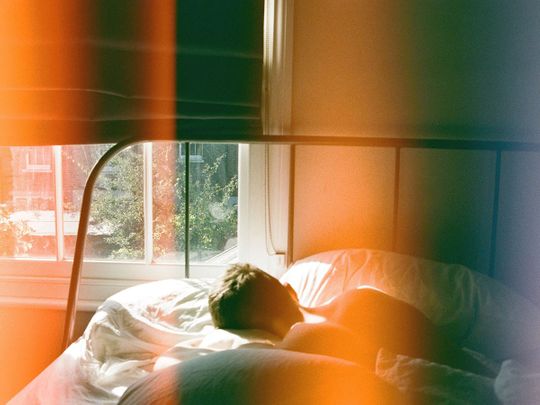
Dubai: Oh, eight hours of snoozing. If only we could master it, we’d be healthier, happier, calmer and sharper and our immunity would be stronger, especially during these trying COVID-19 times.
The National Sleep Foundation claims that it should take between 10 and 20 minutes for an average person to fall asleep. Your daily routine affects how well you sleep. If you go to bed around the same time every night, your body will thank you by being more consistent with your nightly snoozes. Some people are lucky enough to fall asleep the second their head hits the pillow, while others need hours to nod off.
Roughly 35 to 40 per cent of UAE residents have suffered from a sleep disorder at some point in their life, according to Arab Health Online, and sleep problems constitute a global epidemic affecting up to 45 per cent of the world’s population according to the World Association of Sleep Medicine. Research suggests that long-term bad sleep can damage health, while in the short-term, our immune systems suffer and it leaves us zapped, irritable and unable to concentrate.
During particularly stressful phases like a worldwide pandemic with the added stress of exams, relationship trouble, being around your family 24/7. It can all become too much, so it’s normal for sleep to suffer and insomnia can become a chronic problem for some.
But if poor sleep is simply a niggling problem you could really do without, here are some simple steps you can take to help.
1. Take your mind off sleep
This might sound a bit counterintuitive, but bad sleepers are often trapped in a worry cycle. The anxiety of thinking you’ll not be able to sleep is one of the things that feeds the problem. Also, lying in bed worrying about the day’s events or things that might happen in the future is not going to help, but it’s a habit you can address. Free your mind as much as you can. A trick that works is keeping a notebook by your bed and write things you’re worrying about. They’ll be out of your head and can be dealt with in the morning.
2. Cool your room down
Nothing is more disruptive to sleep than an overheated body. The ideal temperature to adjust your thermostat on is between 21 and 23 degrees Celsius. Wear light cotton pyjamas and make sure your bedroom is a cool and dark environment.
3. Put your phone away
Every single phone screen emits a blue light, which causes the brain activity to increase right before bedtime, when we should be doing the exact opposite. If you really can’t live without your phone, then dim your screen, switch on night mode if possible, or download a dimming app, so you can keep your brain activity low.
4. Invest in a good mattress
We’re sensitive creatures, and even the smallest physiological factors can have our brain and body not feeling right. Which is why physical comfort is vital for sleep. Decent mattresses can be pricey, but we spend almost half of our lives in bed, so it’s definitely worth investing in one that offers you the right support and prevents back and neck pain. People often forget that they’re in bed for around six to eight hours a night. Multiply that by 365 days, that’s almost 3,000 hours a year.
5. Let there be less light – and noise
There’s a reason we switch lights off at bedtime. Sleeping in darkness is crucial for the body’s production of the hormone melatonin, which plays a vital part in the sleep-wake cycle. Adjusting little things can make a big difference. If curtains don’t have proper blackouts people tend to wake up earlier due to the light. Also if the AC is noisy, it can affect your sleep.
Consider investing in blackout blinds if light is a problem, especially if you’re a shift worker who sleeps during daytime. Eye masks can help block out ambient light and have been shown to increase melatonin levels.
Similarly, too much noise is one of the biggest factors guaranteed to ruin sleep. Often it’s impossible to eliminate all noise, and some people are more sensitive to sound than others, but earplugs could make the world of difference if noise is keeping you awake.
6. Don’t panic if you wake up
We’ve all been there; suddenly wide awake at 3am, only to spend the next few hours panicking about how we’ll get through the next day.
If you wake up, avoid looking at your phone or clock and registering the time, as you’re more likely to start worrying about how little sleep you’ll get. Instead, lie on your back and try consciously to relax each part of your body, starting from your toes and working up to your head and face. Breathe deeply and tell yourself it doesn’t matter if you don’t fall asleep and you’ll just use the time to rest and relax.
7. Watch what you eat and drink
What and when we eat and drink can affect sleep. Eliminate stimulants like caffeine and sugar before bedtime. Additionally, drinking a glass of warm milk or a cup of chamomile tea at bedtime can induce sleep. Also get into the habit of eating your evening meal as early as possible, and perhaps going for a stroll afterwards. A heavy meal before bedtime is going to be uncomfortable and can cause restlessness, as your body works overtime to ensure it’s digested.
If you’re having trouble falling asleep:
Stick your feet out
Exposing even part of your feet to the cooler air helps your body heat to drop more quickly. It’s a surprisingly simple sleep hack, one that helps you fall asleep more quickly and sleep better.
The 4-7-8 method
Dr. Andrew Weil, a bestselling sleep author, swears by the “4-7-8” breathing method. The method is said to relax you by increasing the amount of oxygen in your blood stream, slowing your heart rate down and getting rid of CO2 from your lungs.
Push your tongue lightly behind your upper front teeth, and keep it there the whole time. Exhale completely. Breathe in through your nose for 4 seconds, hold your breath for 7 seconds, and then release the breath through your mouth for 8 seconds. Repeat the cycle and you should fall asleep within 1 minute.
Massage your pressure points
Massaging certain parts of your body causes you to relax and fall asleep faster. Apply pressure to the area between your eyebrows right above your nose for 1 minute. Press the area that’s between your first and second toes, on top of the foot. Or massage both of your ears for a minute.
Reverse Psychology
Instead of forcing yourself to fall asleep, why not focus on trying to stay awake? You should try making yourself stay up, by reading or by thinking of something elaborate, and your mind will feel tired and start falling asleep.
A few extra tips that work:
Blink uncontrollably for 1 minute straight
Wear a sleep mask to eliminate light completely
Breathe out of your left nostril 26 times
Use a white noise app
Don’t look at the time. That will stress you out and make it even more difficult








